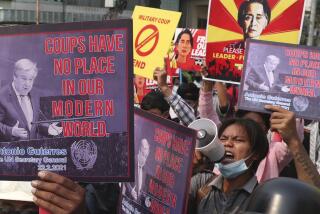Surviving ‘Burma head’
- Share via
Foreign journalists are officially denied visas to Burma. Some, like myself, are able to slip in on tourist visas, but visitors suspected of being reporters are routinely followed by government spies. Their hotel rooms are often searched, their telephone lines may be tapped and, if they are found out, they are swiftly deported. Burma, now officially known as Myanmar, has been ruled by a military dictatorship for nearly half a century, and it is no easy task trying to report from inside the country.
It was on a train heading north from Mandalay that I unwittingly met the military intelligence agent who had been assigned to follow me. He was a large, jovial Burmese man who introduced himself as a timber merchant. Out of a natural sense of caution I never told him I was a writer but, as it became apparent we were heading to the same town, we spent the overnight journey sharing snacks and chatting pleasantly while the train juddered along in the darkness.
Once at my destination, I was surprised by how often I bumped into my newfound friend. “Where are you going today?” he would ask by way of greeting. I didn’t think much of it until my final day in the town, when I met him on my way to the train station. In response to his usual question I told him I was heading back to Mandalay. He faltered for a moment and then smiled brightly. “What a coincidence!” he said. “I also am on this evening’s train to Mandalay.”
I belatedly realized that our meetings were not at all coincidental. So I made sure we sat in separate carriages and managed to disembark just before the train pulled into Mandalay station. I hailed a tri-shaw to take me to a hotel and, as I was pedaled through the early morning mist, congratulated myself on my cunning escape. It was a short-lived victory. I walked out of my hotel room later that morning and was startled to see the “timber merchant” emerging from the next-door room. He flashed me a broad grin. “And where are you going today?” he asked.
Foreign correspondents call it “having Burma head,” in reference to the intense paranoia from trying to navigate the suspicious environment of a military dictatorship. There are times when “Burma head” is well-founded: An American journalist I know who had conducted seemingly secret interviews with the beleaguered opposition party in Burma later saw her notes and photographic film confiscated by the authorities. She was subsequently deported.
And then there are times when the paranoia can go into overdrive. How, for instance, do you identify who might be an informer? One Burmese friend advised me to operate under the assumption that everyone I met was a potential informer, even him. Until I learned the finer arts of observation, I found myself (to my shame) glaring at waiters who asked innocent questions such as “where are you from?” or snubbing strangers who wanted nothing more than to practice their English with a native speaker. The fear works both ways, and for Burmese people the repercussions are infinitely greater. Providing foreigners with news or information antithetical to the regime is punishable with a prison sentence under the country’s 1950 Emergency Provisions Act. There are Burmese who will not talk to foreigners, and, if they do, prefer to chat only about “safe” topics such as the sweltering heat or the beauty of the temples at Burma’s ancient capital, Pagan.
While I spent the better part of two years in Burma working on a book about daily life under a dictatorship, it was the simple logistics of my research that caused me endless worry. Because my notebooks were filled with information the regime could use as incriminating evidence against the Burmese people I was meeting, I thought the safest thing would be to carry them around with me at all times. When I became concerned that I might be stopped and searched, I took to hiding them around my hotel room. But then I walked in on a hotel cleaner going through my belongings (she was looking through a folder full of newspaper clippings I had stashed under my mattress). In the end, I developed a code for writing in my notebooks -- a code so secretive that I later had considerable difficulty deciphering my own notes.
With my time in Burma now over, and my book completed and published, Burma head seems like a distant madness. It is hard to imagine I was once so obsessive about covering my tracks that I not only shredded, but set fire to, a list of reminders to myself that contained such incriminating lines as “buy washing powder” and “call Mum.”
More to Read
Sign up for The Wild
We’ll help you find the best places to hike, bike and run, as well as the perfect silent spots for meditation and yoga.
You may occasionally receive promotional content from the Los Angeles Times.






